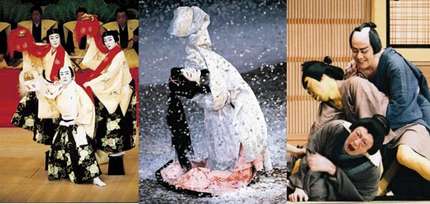
Kabuki Theatre in high definition on the big screen
Since its birth in the 1600s, Kabuki Theatre has remained at the cutting edge in the 21st century. Cinema Kabuki brings the colours, textures and sounds of live Kabuki to an international audience, with live productions featuring the greatest Kabuki actors recorded by multiple HD cameras. Intended for screening in movie theatres on high-quality digital projectors with 6-channel sound, Cinema Kabuki brilliantly recreates the vivid experience of an art form that is rarely seen outside of Japan.
Trailers on YouTube:
Heron Maiden
Triple Lion Dance
Tickets on sale online at www.cineplex.com and at theatre box offices, starting January 21. (Click here for instructions)
$15 + tax: Heron Maiden
$20 + tax: Rakuda: Party with a Dead Man, Triple Lion Dance
(tax included)
For more information: www.jftor.org or 604.607.5978 Vancouver
Heron Maiden (Sagi Musume)
a dance performance
Premiered in 1762
Directed for Cinema Kabuki by Hiroyuki Nakatani
Recorded live at Kabuki-za Theatre, Tokyo, 2005
32 minutes
Subtitled in English
From a white heron to a coquettish girl, to a woman seducing her lover and hellish betrayal, Heron Maiden is one of the most challenging pure dance roles in Kabuki Theatre. With 15 musicians on stage, and dramatic instant costume changes amid swirling snow, the popular Heron Maiden is only performed by a star Onnagata (males actors specializing in female roles). From his first bird-like steps to his expressive fingers, this is Tamasaburo’s signature piece.
Rakuda: Party with a Dead Man (a black comedy)
Premiered in 1928
Based on a rakugo story
Written by Onitaro Oka
Directed for stage by Shigetami Enomoto
Directed for Cinema Kabuki by Hiroyuki Nakatani
Recorded live at Kabuki-za Theatre, Tokyo, 2008
52 minutes
Subtitled in English
When unpopular tenant Uma dies, his only friend Hanji cooks up a scheme to make some money. He sends Kyuroku, the junk collector, to demand support for the funeral celebrations from Uma’s miserly landlord – or the dead Uma will come to his house and dance. Kabuki’s most powerful acting duo, Mitsugoro and Kanzaburo, light a fire under this black comedy, which turns to hilarious farce with the aid of copious amounts of sake.
Triple Lion Dance (a dance performance)
Renjishi
Premiered in 1872
Written by Mokuami Kawatake
Revised version premiered in 1901
Directed for Cinema Kabuki by Yoji Yamada
Recorded live at Shimbashi Embujo Theatre, Tokyo, 2007
55 minutes
Subtitled in English
The Kabuki Lion Dance usually features a father/son duo as two powerful lions who explore the challenging father/son relationship. The Triple Lion Dance is extraordinary not only because it stars the legendary Kanzaburo, but also his talented sons Kantaro and Shichinosuke who shine as the younger lions, showcasing three of Japan¹s most revered mythical beasts. Look for unusual hand-held shishi masks which evolve into majestic full mane costumes. The father lion is one of the most prestigious and sought-after roles for Kabuki dancers.